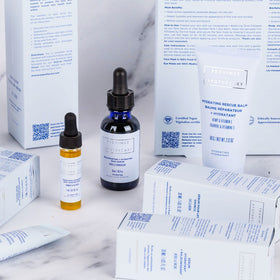How Vitamin C Can Help Reduce Stress

Our daily life is full of stress. From getting to work on time to relationships and financial issues to waking up before we’re fully rested, we are surrounded by stressors all day long.
When the body is exposed to stress, the hypothalamic-pituitary-adrenal axis (or HPA axis) is activated. A cascade of hormonal changes occurs that causes the release of cortisol-our primary stress hormones - from our adrenal glands. Normally, when a stressor goes away, a negative feedback cycle turns off the HPA axis and reduces the release of cortisol.
Unfortunately, a lot of us are constantly activating our HPA axis and suffering from chronic stress and a constant surge of cortisol.
One of the best things we can do to negate these effects and prevent further damage is to add more vitamin C into our diet!

Vitamin C:
Vitamin C is utilized by the adrenal glands in the production cortisol. When you are faced with a stressful situation, your vitamin C is rapidly used-up. Your adrenal glands "panic" when they don't have enough vitamin C available, and, release MORE cortisol. This not only increases your immediate anxiety, as this state of high cortisol is prolonged, but it also elevates your blood sugar, blood pressure and contributes to premature aging and an accumulation of belly fat.
When we don't get enough vitamin C, we are also weakening our immune system, and become more vulnerable to illness which then adds more stress on our adrenals. Vitamin C stimulates the production of white blood cells, your body’s first defence against infections. It also stimulates production of liver-detoxifying enzymes that help eliminate and detoxify products from your body including excess hormones, free radicals and environmental toxins.
Making sure to get lots of vitamin C per day is a great way to prevent the effects of stress. Some of the best food sources of Vitamin C :
- Lemons
- Blueberries
- Blackberries
- Bell peppers
- Sweet Potatoes
- Broccoli
- Oranges



